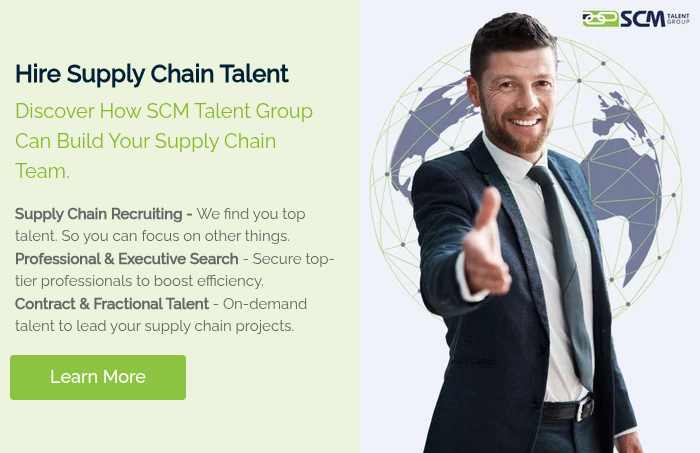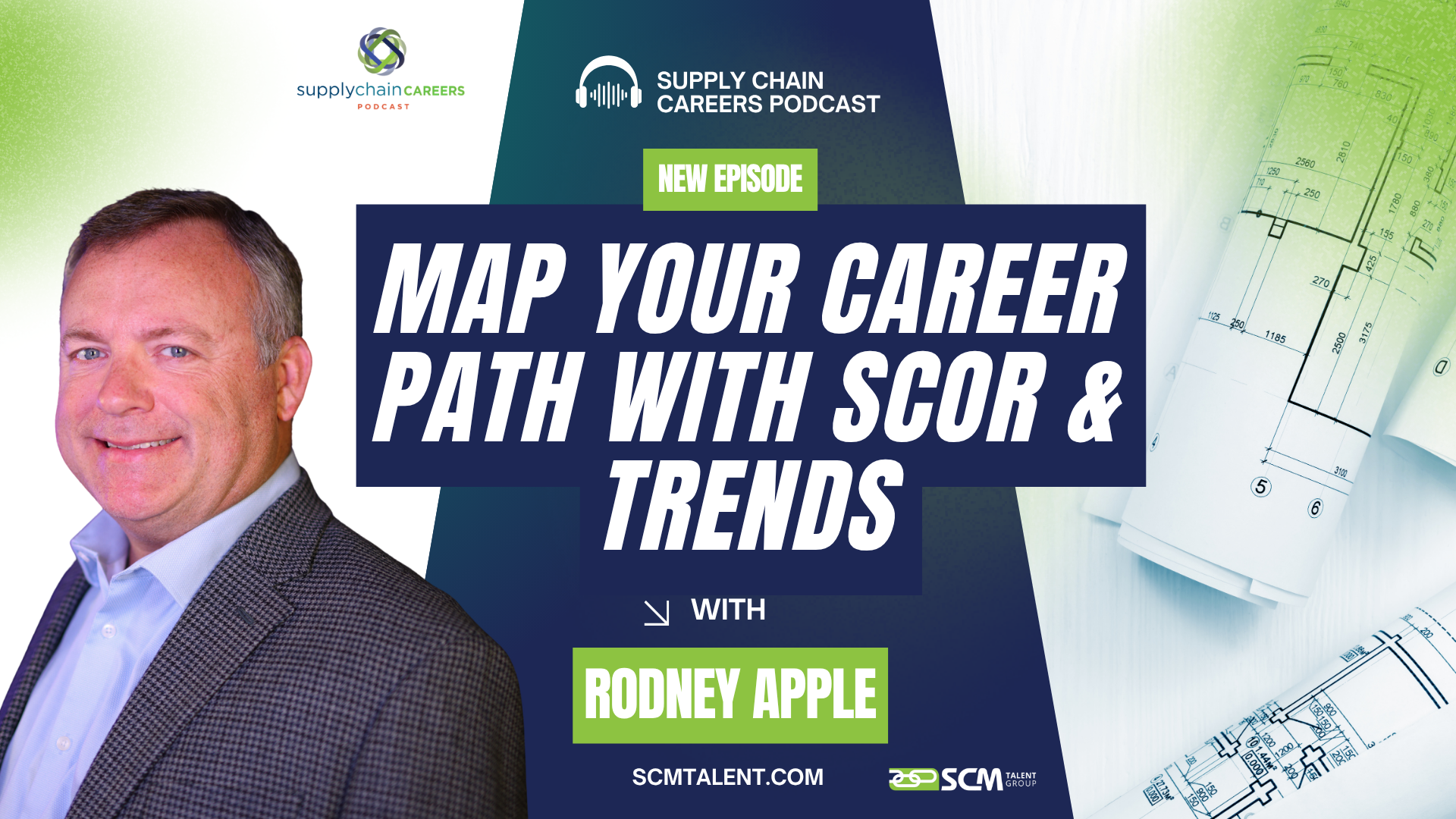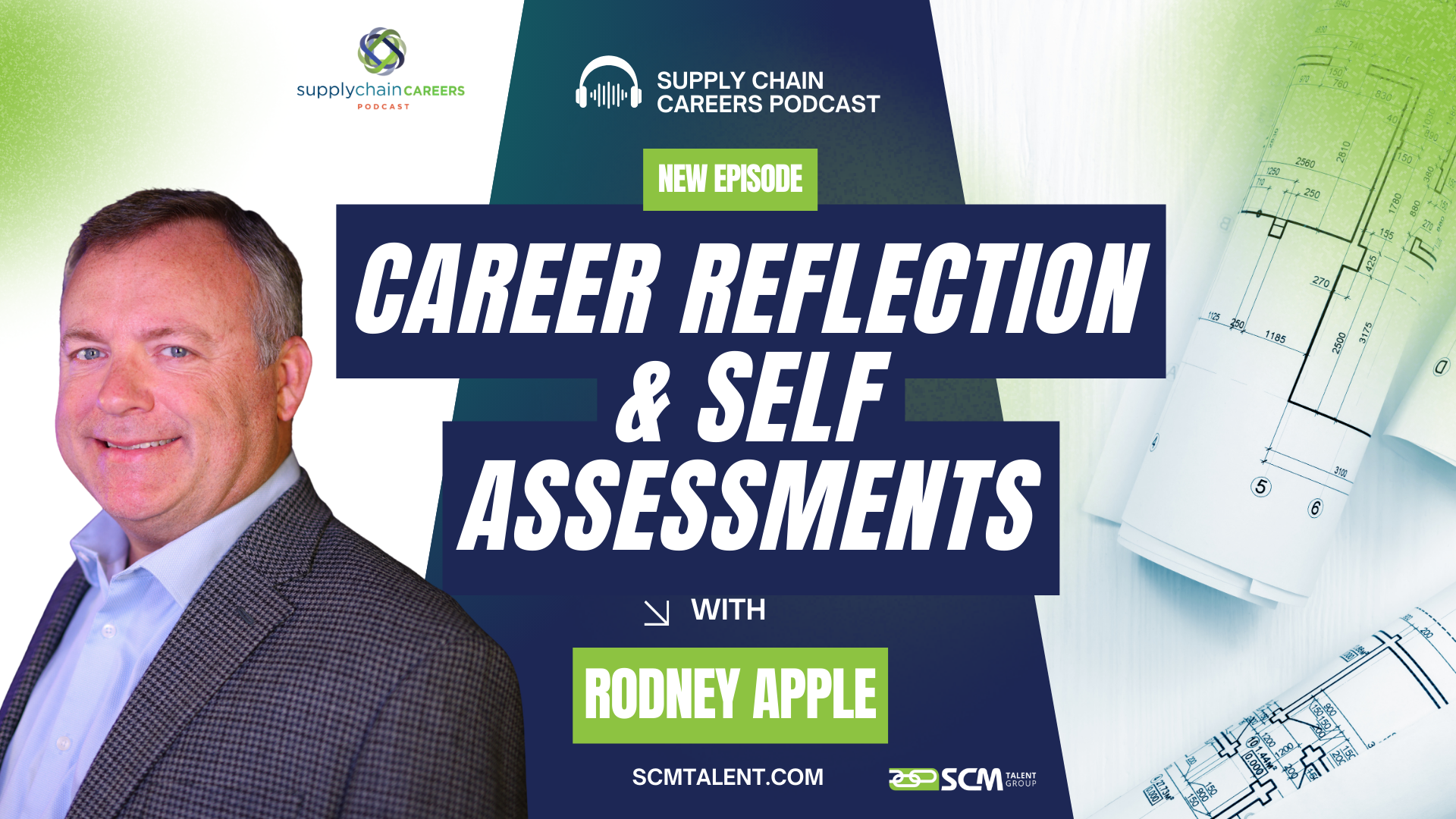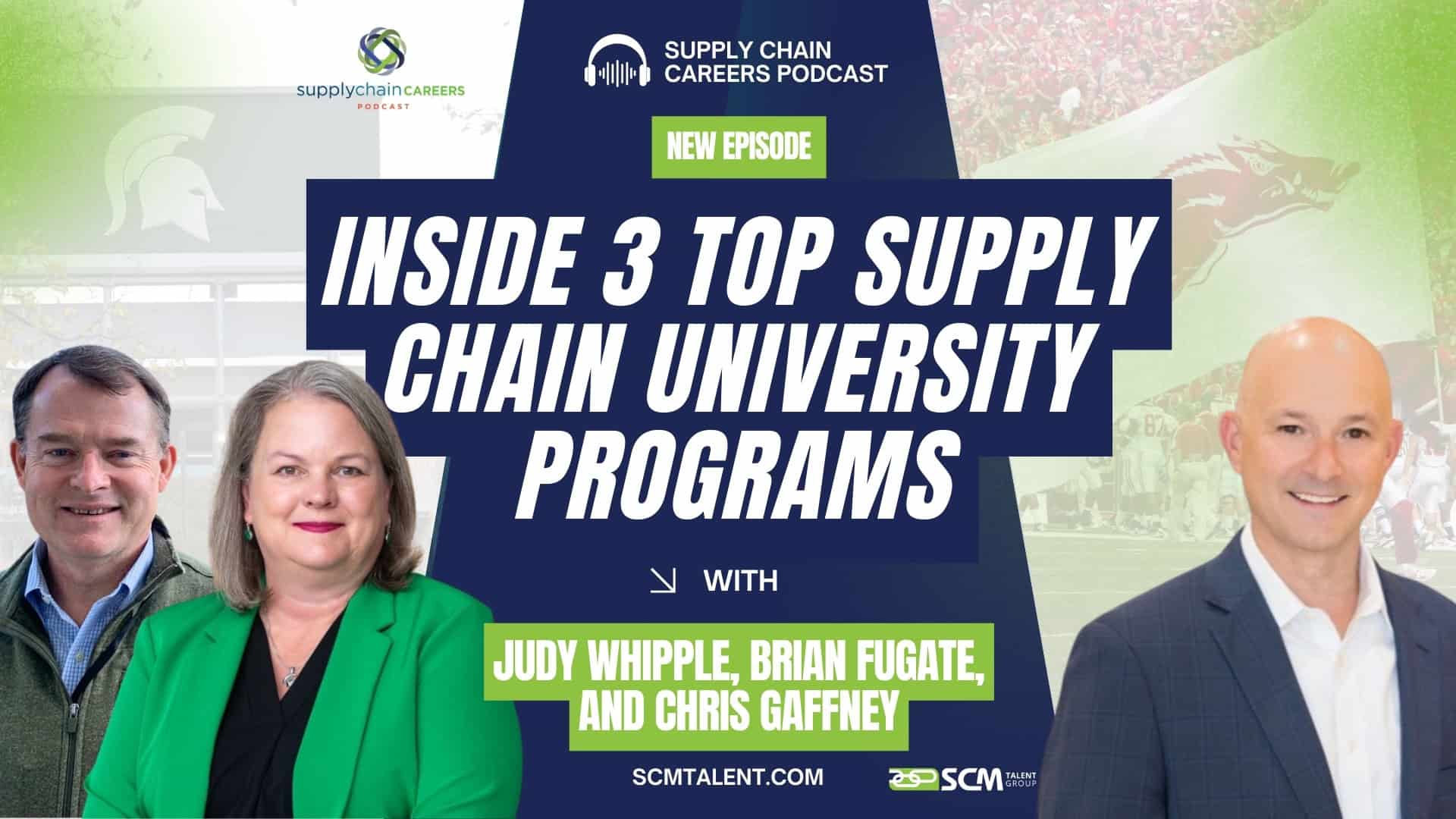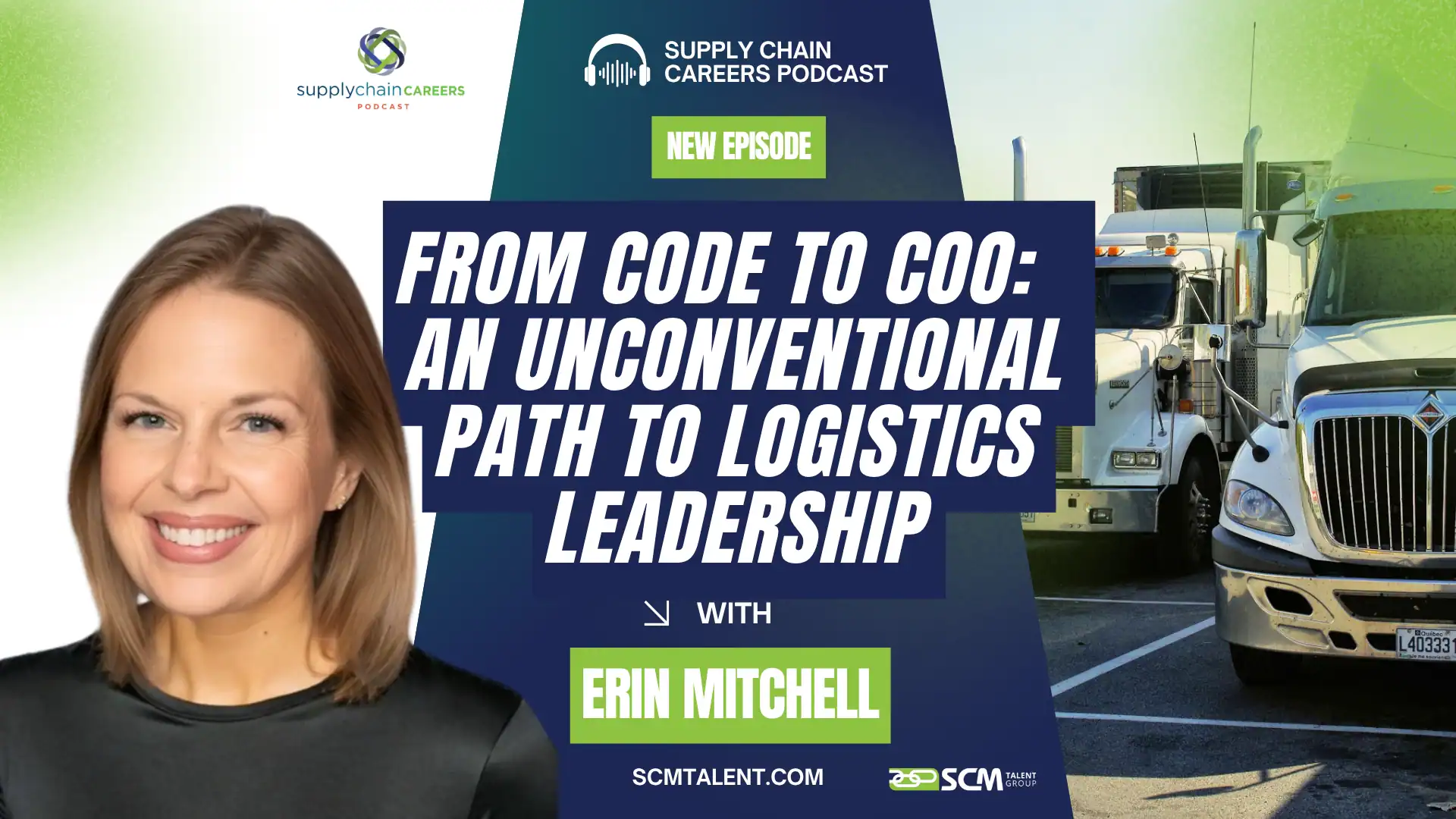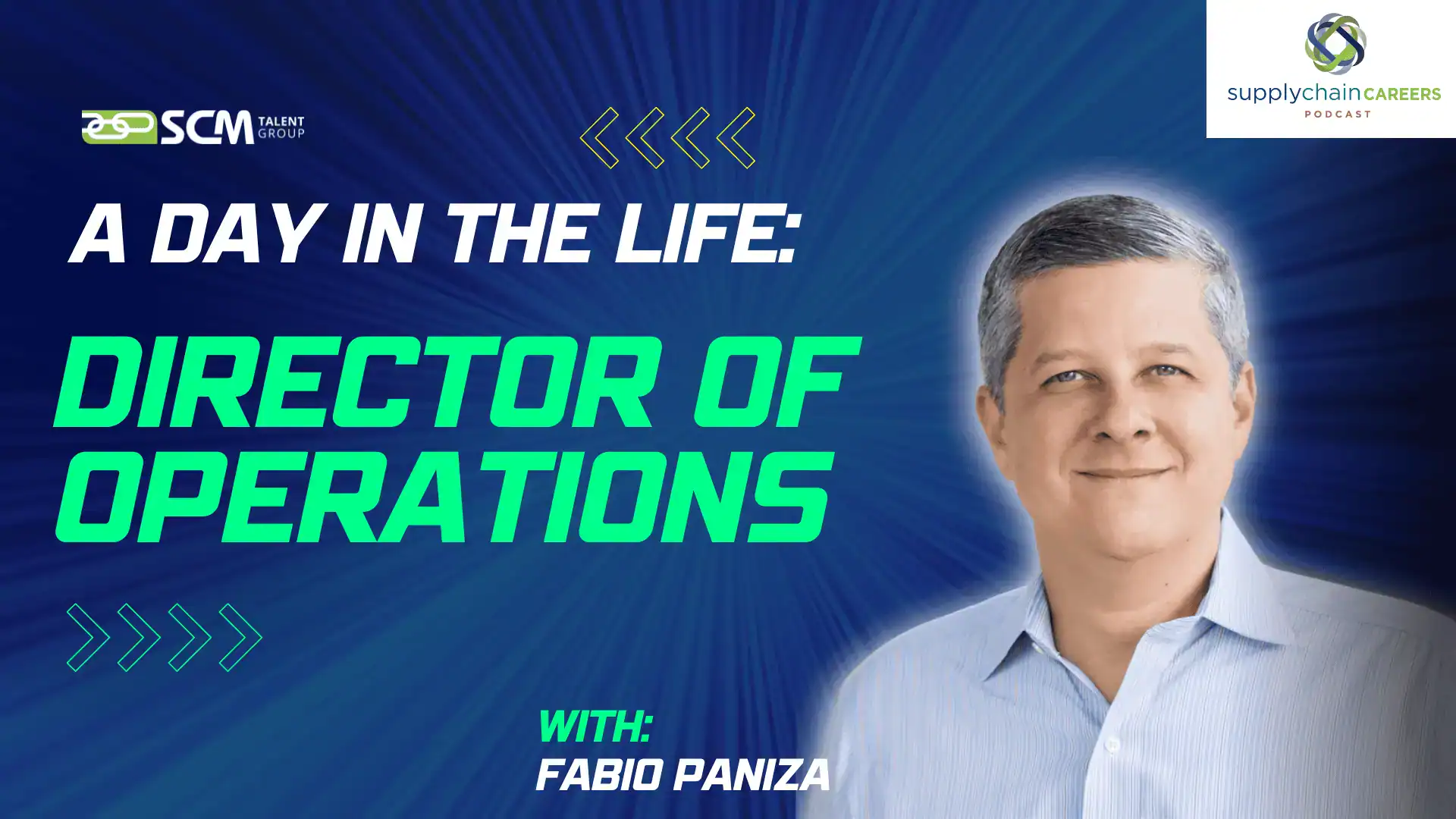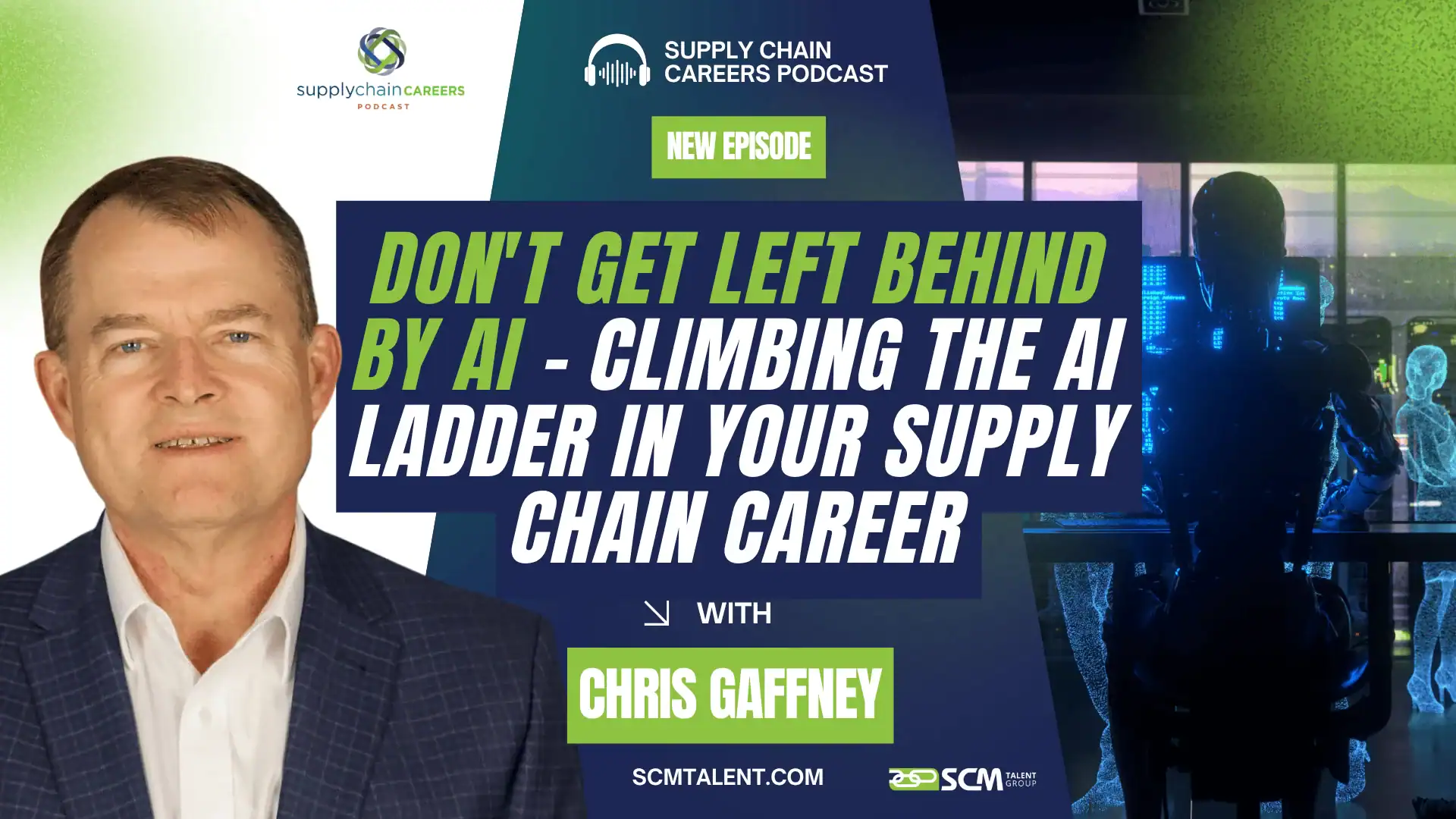
Don’t Get Left Behind By AI – Climbing The AI Ladder in Your Supply Chain Career
Featuring:
🎙️ Chris Gaffney: Managing Director, Georgia Tech Supply Chain & Logistics Institute
🎙️ Guest Host: Brian Kennedy, Marketing Manager at SCM Talent Group
This episode was produced in partnership with Georgia Tech’s Supply Chain & Logistics Institute, a global leader in professional education for supply chain and logistics. Learn more at scl.gatech.edu.
Artificial intelligence isn’t just transforming supply chains – it’s redefining the skills supply chain professionals need to stay competitive. In this special episode of the Supply Chain Careers Podcast, Chris Gaffney outlines a clear and achievable path for professionals to grow their careers through what he calls the AI Maturity Ladder. (Featured in the image below)
Rather than getting overwhelmed by AI hype, Chris walks us through a practical, six-step framework that takes you from Excel proficiency to developing your own AI agents – regardless of where you are in your career.
The Six Levels of the AI Maturity Ladder
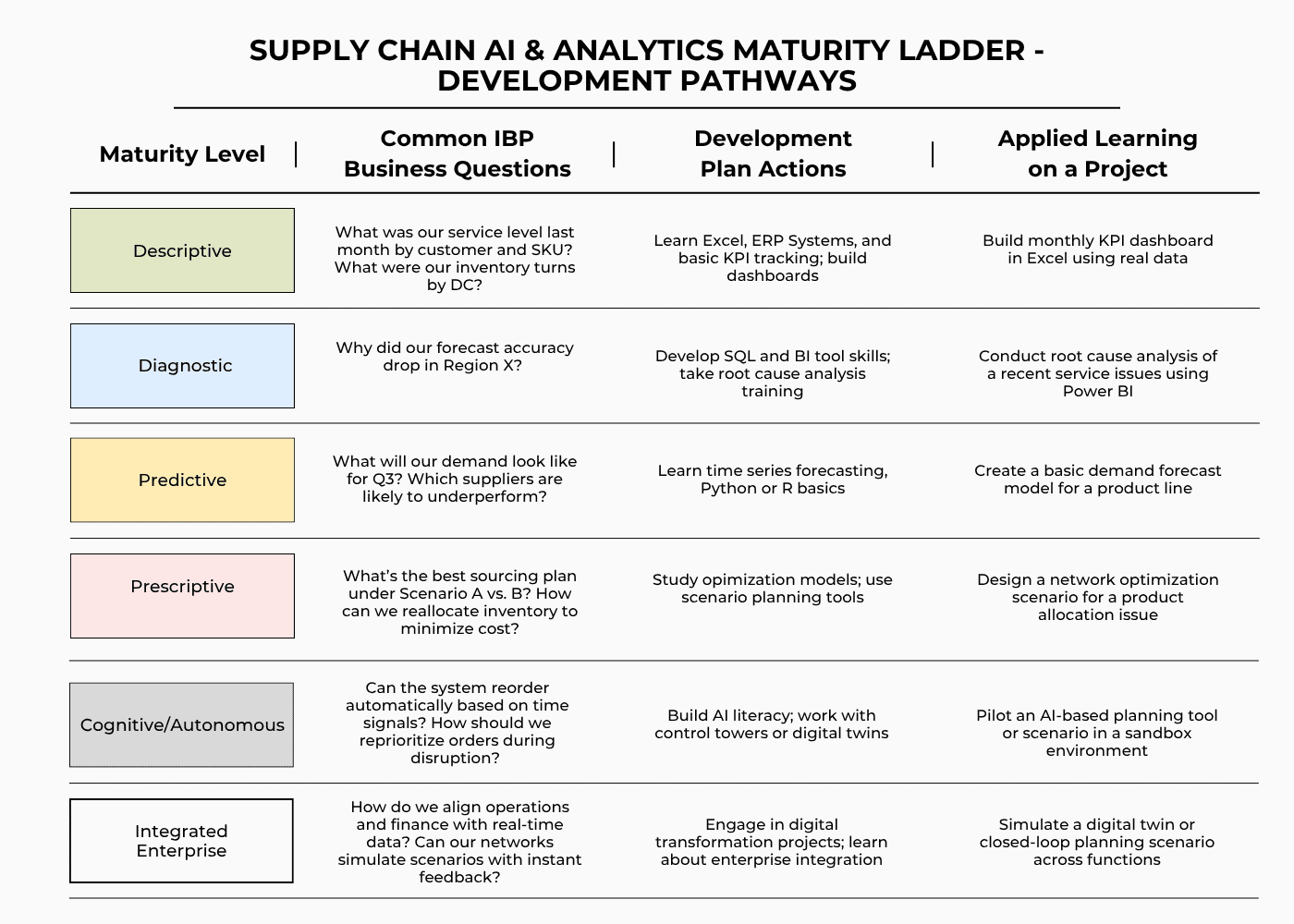
Who is Chris Gaffney?
Chris Gaffney currently serves as Managing Director of Georgia Tech’s Supply Chain and Logistics Institute (SCL).
Chris Gaffney was most recently VP of Global Strategic Supply Chain at The Coca-Cola Company. During his 25-year tenure with Coca-Cola, Chris held multiple leadership roles including President of Coca-Cola Supply, SVP Product Supply System Strategy, VP of System Transformation, and VP of Logistics for North America. Chris also served as President of the National Product Supply Group; a governing body responsible for 95% of volume produced in North America. Following his retirement from Coca-Cola in 2020, he assumed the role of Principal at ECG and partner at EDGE Supply Chain, providing advice and consulting in the Supply Chain space. Gaffney has extensive experience in Consumer Products Supply Chain, Supply Chain Strategy & Transformation, Footprint Design & Network Optimization, Supply Chain Operating Model and Capability Building and Logistics and Supply Chain Planning.
[00:00:00] Mike Ogle: Welcome to the Supply Chain Careers podcast, the only podcast for job seekers, professionals, and students who are focused on career enhancing conversations and insights across all aspects of the supply chain discipline. This podcast is made possible by SCM Talent Group, the industry leading supply chain executive search firm.
Visit SCM Talent [email protected]. What if your career wasn’t just focused on keeping up with supply chain changes, but instead on how to lead them? At Georgia Tech Supply Chain and Logistics Institute professionals are building the skills to lead through change, not just react to it. The Institute’s professional certificates cover planning, logistics, procurement, and advanced analytics.
That includes the supply chain analytics certificate designed for data-driven professionals. Who are ready to go beyond the basics. So get started on leveling up your career by going to scl.gatech.edu. Again, that’s scl.gatech.edu. In this special episode of the Supply Chain Careers podcast, longtime co-host Chris Gaffney is focusing on artificial intelligence, specifically the AI ladder that supply chain professionals can climb to advance their careers.
Chris is joined by guest host Brian Kennedy as he poses the important questions that are on the minds of many. Professionals listen as Chris and Brian discuss how AI has evolved in supply chain, the connection to advanced analytics and the importance of machine learning. They talk about the step-by-step climb for both teams and individuals, up to six levels of the AI maturity.
Ladder up your game in AI by learning those steps that take you from the backward looking what happened and why it happened. To what will happen next and what should I do about it to the career changing? How can I develop AI agents to learn and assist me? Listen and learn how to climb the ladder to make AI your career enhancing partner rather than a threat to your career?
[00:02:14] Brian Kennedy: Welcome to Supply Chain Career podcast. My name is Brian Kennedy. I’m a guest host On this week’s episode, I’m with Chris Gaffney here, and today we’re gonna talk about. AI into the supply chain and what you can do to not get left behind in your career. Chris is gonna cover a AI ladder that supply chain professionals can follow in their career to make sure they’re up to speed.
So let’s get into it.
[00:02:38] Chris Gaffney: Awesome. Awesome to have you on as a guest host. We should have a nice chat today.
[00:02:42] Brian Kennedy: Let’s do it. So I’m gonna ask you a couple questions here and just to learn more about AI supply chain careers. What people can do to stay up to speed and everything to do with that. All right, let’s dive in.
First question, Chris, how have you seen the role of AI kind of evolve in supply chain over the past few years?
[00:03:04] Chris Gaffney: Yeah, I was thinking about it. I talked to a group last week out in Houston on this topic of AI and supply chain and AI as a term has been hyped and for lots of people. It’s a turn they may have heard of in one or more context for, I dunno, 20 or 30 years depending on where you sit when it turns to practical applications.
I had to look back to 2017 or 2018 was at when I was at Coca-Cola, and that was the first time I saw examples of actually a application of machine learning. And I was curious. I managed a team that did optimization, you know what I would call advanced analytics at the time. And as this was coming in, I felt the need to be curious and say, what is this?
What does it mean? And fortunately, we had some great folks working on some interesting pilots. At the time we were launching a new fountain platform called Freestyle, where, which looks like a big refrigerator. And instead of picking eight different drinks, you could pick an infinite number. But the machine was designed.
To give us telemetry that would report back every night. So there’s this massive volume of data and the team was curious in particular, could they use that data to predict when the machine was gonna fail. So that, and again, in the larger context of it, we define machine learning as being within the broader umbrella of ai.
So I think from that point forward, a lot more experimentation and as I interact with. Companies who I think are really leading in that you started to see more application. And I really think since Gen AI came out, we’ve gotten into this democratization of this where you don’t have to be at a big company working with some big partner or making a massive investment to where you can understand how you can bring this to life.
And then fast forward to my time at Georgia Tech, I’ve seen students who are just. So curious and so industrious. They teach themselves this stuff even outside of a classroom setting.
[00:05:10] Brian Kennedy: So yeah, you’re already hitting on a machine. Learning seems like a skill that’s becoming very prominent within the success of a professional in supply chain.
Can you harp on why specifically you think machine learning and even Python are becoming increasingly growing skills?
[00:05:27] Chris Gaffney: Yeah, this kind of, to me. This is what the genesis of an article I’ve written on this space and this idea of this maturity ladder, which I’m not gonna say I created. I gathered it together from things that I’ve seen and heard, and I put machine learning at the center of it.
And the importance of it is, to me, the latter idea takes something that could be a very unrealistic height to climb. Breaks it into smaller pieces where anyone can see themselves moving up one step at a ladder. And if the beginning of that ladder is something that a lot of people can anchor on, then we can start to, to move this away from, this is not achievable for me.
I’m mid-career, I’m beyond a formal learning setting or whatever. For me, we put at the foundation of this ladder, things like Excel, that almost everybody has some mm-hmm. Affinity. Mm-hmm. And if you have some ways of. Walking around, working around in Excel, then you’re on the ladder, and if you’re on the ladder, then we can give you a view to how you get all the way up the ladder.
But to me, machine learning now is at the middle rung of that ladder because it’s a gateway to get into legitimate AI and the steps from someone who understands Excel to someone who can apply. Machine learning are very feasible steps for someone to take. Mm-hmm.
[00:06:57] Mike Ogle: What if your career wasn’t just focused on keeping up with supply chain changes, but instead on how to lead them at Georgia Tech Supply Chain and Logistics Institute professionals are building the skills to lead through change, not just react to.
The Institute’s Professional certificates, cover planning, logistics, procurement, and Advanced Analytics. That includes the supply chain analytics certificate designed for data-driven professionals who are ready to go beyond the basics. So get started on leveling up your career by going to scl.gatech.edu.
Again, that’s scl.gatech.edu. During this short break, we recognize that this podcast is made possible by SCM Talent Group, the industry leading supply chain executive search firm. Visit SCM talent [email protected].
[00:07:51] Brian Kennedy: So you feel based on how the ladder is constructed, that someone can almost look at it and be able to identify where they align on the ladder. What we did, and I
[00:08:01] Chris Gaffney: know we’ll probably publish a link to a graphic of the latter, is to do it in two different ways. I did it from an organizational setting and from an individual setting.
So part of it is where is your team and what is your team or company capable of doing? And that suggests how you need to work with your team to grow capabilities. But obviously inside of your team, beyond the data and the, the tools and the technology are the people. So then it comes down to what’s the development planning path for.
Individuals. And the idea around the ladder is we can give examples. If you can do these things today, then you’re here on the ladder. Yeah. And the idea is classic adult learning. We’ve talked about that in our podcast. That 70, 20, 10, 10 kind of ratio, 70% on the job, 20% mentoring and coaching, 10% formal training.
In a work setting and even for some of the kids that I see working on it in the school setting, it’s still outside of class where they’re messing around with this stuff. That can be your on the job mindset and in almost all cases you can find a mentor in that 20% setting. That’s what I found at Koch. I found people who were more advanced in this than me.
O Khan, who is a friend of mine, he did that first project in machine learning at Koch and he was his good friend of mine and I said, can you explain to me. How this thing works, and the idea was all of this past data, there’s trends and there’s inferences in there. And if you can put that through a model using a variety of different techniques, it could be as simple as a regression model that if somebody’s taken statistics to understand, you can see that there’s a pattern such that when those same signals come in the future, you can reasonably reliably predict what’s gonna happen.
Like. Mm-hmm. Okay. That’s a explaining to me like I’m five kind of example of machine learning. If you get that type of person for you on the ladder, they can help you figure out how to, in your, on the job work, start to use some of this stuff. And then occasionally there may be a case for a class. Right at, at Georgia Tech, in our professional education, we take teach three day classes and in our advanced analytics, our supply chain analytics courses, it’s four classes, three days each.
You could take ’em over a course of a year. You can just take one. We have one that really is the gateway to machine learning. So in theory, in three days you could get an intensive and then go back and apply it. But the fact is, today there are free courses online. You can have chat, GPT create your own learning term.
My, my whole point to this is just as what you said in the title, I don’t want people to feel like they’re left behind. Yeah. Whether they’re 27, they’re outta school and they’re don’t have time. To go back and get a master’s in analytics, which you could if you had a year and, and $11,000 or your mid career and beyond, right.
In your forties or fifties and say, I’m feeling uncomfortable about am I gonna be employable? Doesn’t have to be that way. Yeah. That’s my main message. Yeah.
[00:10:54] Brian Kennedy: Great. Interesting to hear you just talk about statistics. ’cause I just graduated with my MBA and linear regressions, multiple regressions, like all that stuff in statistics.
Excel crystal ball, that’s. A lot of what we were doing. But that’s like low level to what you’re saying. And I say that though ’cause I feel like I can build a picture here. If you were to look at the the ladder, is there a kind of a level, you could say people more on the lighter side, the descriptive, the entry, lower level maturity.
Does that kind of correlate with any specific supply chain roles that you can see? And then if you’re more developed in the ladder, would that correspond to later level? People in supply chain, and if so, what would be some of those positions?
[00:11:40] Chris Gaffney: It’s a good question and I think it’s changing. Okay. When we first started to see what I called advanced analytics, which was the term we used before we really saw AI applied ai, we would think about our analysts, right?
In our group at Koch, in our national product supply group, we had. Analysts, we had consultants, we had managers, we had directors, that kind of ladder. And interesting for, from us, we actually had co-ops below that who would even be junior analysts ’cause they were still in school. And I think at that time we were thinking about a model that would say someone’s an analyst, someone could be a data scientist at a more senior level.
And we actually brought somebody in who was at that level. Mm-hmm. And then we had this idea of somebody who is a citizen data scientist in between. The idea was the data scientist would probably have more technical knowledge about these type of tools we’re talking about. The analyst might have more context around the supply chain problem we’re trying to solve.
That makes sense. And we were trying to bridge the gap in that space. And the idea of the citizen data scientist would be somebody who is an analyst who had some greater affinity, might have a career aspiration to move into a data science kind of role. And we were trying to bridge them up where they could do more complex things.
They were doing more than just. Cleaning the data, massaging the data, which is a necessary frontline to this, and probably at that bottom level, right? Can I clean up larger files of data so that they can be utilized in analysis? That’s probably down at that analyst level, and we actually had a lot of our junior analysts and co-ops doing that type of work.
But what I would say to you is, I do think it’s changing, right? Yeah. As this democratization is changing, you may be. In a role that, and I would say outside of an optimization group like mine, there’s a lot of supply chain planners, right? Demand planners, supply planners, transportation planners. Yep. Those folks who might typically have been using primarily a tool set like A TMS or a WMS or an advanced planning platform off the shelf, commercial name brand platform, they are now being brought into this world.
Mm-hmm. Because many of those platforms now have these. AI tools started to get embedded in the platform. So they’re there, but the ones who are starting to differentiate are saying, I need better skills because I’ve got complex problems to to deal with. And if you think about the decision making part of the ladder, the corollary to the ladder, and we haven’t really gone through it, but foundationally, you’re in that descriptive kind of mode.
You’re talking about what happened, mostly rear view mirror. Kind of stuff. That’s the world of Excel. That’s the stuff that’s coming out of your can software outta your SAP or outta your planning tools. Those are very basic dashboards, reports that you’re trying to deal with. Spillt milk kind of thing.
You get to that second level and it’s more diagnostic and it’s like, why did it happen? Very few of those off the shelf tools have that capability built in and at that point you’ve got. You need more help, right? You’ve gotta dive into the data, whether it’s an output of, of the solve or a run of these tools.
And then you’ve gotta dig into say, what is the output of this telling me? And that’s where you’ve gotta have additional skills, right? So my long answer to that, and we’ll, I’ll go quickly up predictive then to prescriptive, and then you’re into the AI world of moving to that cognitive world. And then the end state for us, which very few people are at, is a really integrated enterprise.
My point is. Now it’s everybody’s job. Okay? May not be to the same degree as people who are specialized in data sciences or deep into an optimization kind of role, but my main message is I think everybody needs to be on the ladder, right? The, the sure way to get left behind is to stand still, right? The kids coming outta school have greater tools and skills.
You have people who are your classic, highly motivated peers. They’re out there doing it. They’re going to grad school while they’re working like you did, or I’m not saying everybody needs to do that. But you need to have your own plan to climb the ladder.
[00:15:42] Brian Kennedy: Yeah. So Chris, there’s six rows of maturity level on this ladder that you have here.
I think you’ve covered descriptive and diagnostic fairly well. Do you mind explaining to me some of the more mature levels like predictive, prescriptive, cognitive, and then integrated enterprise ultimately?
[00:15:59] Chris Gaffney: Yep. You see, you could think about when I said if you’re in the prescriptive or diagnostic world, you’re in that what happened and why did it happen?
And. From a business standpoint, in many cases that’s pretty low value because you really are dealing with rear view mirror, s spillt milk kind of stuff. Yes. When you get into the why did it happen, you can potentially say, okay, we could get to a corrective action if we understood cause and effect, but it’s more important for the leadership team.
They’re like, Hey, I wanna start to understand what could happen so that we could, before it happens. Potentially take a step to get to a better outcome. And that’s the real value of being predictive. And I remember the other thing that was going on in that 20 17, 28 time, everyone was starting to talk about these dashboards and digital twins and that type of thing.
And what it turned out was the Achilles heel of most of those is that they were not predictive or prescriptive. They were just descriptive or diagnostic. And I recall we. At Koch in my last year there probably in 20 19, 20 18, 20 19, we had outside in help, and one of the anecdotes that we got on our own journey in this space was at that time even Amazon and Walmart were saying, we will not invest in anything that is not at least predictive when it comes to dashboarding or.
Decision making tools that we would do on a bespoke basis. So that prescrip prescriptive world is where you need to start having these models that can look at the data in the mm-hmm. And give you a reasonable inference around what could happen in the future. Because then you can start to say. Do I like that?
Yeah. Or not. Yeah. And so that’s where you start getting into those Python skills. The SQL is, to me, a hallmark of being diagnostic. I can grab at those big sets of data, I can work with data that may be in multiple tables. Yeah. In my data lake. Once you’ve done that, I can visualize the outputs of that in a Power bi IRA Tableau reporter dashboard.
Right. But then you’ve gotta leverage the Python. Kind of skillset to be able to do more than that. You’ve gotta use that to be able to then start to say, I can forecast something. I can highlight a potential risk based on a set of conditions that have occurred in the past, and if they occur again, we could have a problem.
[00:18:25] Brian Kennedy: I’m gonna stop you there. I think it would be helpful for people to understand what are some of the actual. Capabilities that these tools would be able to predict if integrated correctly. So forecasting what exactly is forecast what, like what are some of these risks or things like that. I think that might be helpful to highlight.
[00:18:46] Chris Gaffney: Yeah, so I’ll start with like demand forecasting and many people have said we’ve had tools that do demand forecasting for the last 50 years, some form, some timeframe like that. The hope is with these type of tools, the additional quality of forecasting you get. First and foremost can, could include data outside of your world.
And most of the tools that we have, the forecast are heavily leveraging your own history. And the reality is, and I spent most of my time in consumer products goods, your ability to sell a product next year is different than your ability to sell a product this year. ’cause you don’t control everything.
Okay? The competition’s done something different, the economy might be different and. You need more complex models to be able to suggest how those things might change your, your ability to sell something. And that’s where these type of models have a much greater ability both to be customized, to be able to ingest additional data sets, right?
So you are using, uh, SQL dataset of your own history and your own promotional and pricing tables. Now you can say, I can pull in a publicly available data set that might. Look at weather that might look at labor data, more variables, those kind of things, and then all of a sudden you get a much richer forecast that’s out there.
I think the same thing is true for risk alerts. Okay. And, and the story I will tell here is also on the Amazon story, but I have a friend there and they were working about this time on what they call disruption management. So this was in. You as a consumer trying to get your perfect order and their own internal statistics at the time said that 80% of your and my consumer orders on Amazon at the time, something went wrong with that order between when you ordered it and when it got to your home in that example.
And their view was they wanted to reduce that percentage. So their idea was. We have data that suggests why these things happened in the flow of the order from wherever it sat. The second they said, this is the size 12 red Jordans that you want to buy. They were in Omaha and they needed to get to Asheville.
They were able to use that data to say, these are the conditions that occur when that could create a disruption. We want to change those conditions. So a lot of the predictive work that we talk about can highlight, Hey, these are the conditions that cause us to say we need to do something different. And I know today that Amazon is using weather to decide today, for tomorrow, do they switch whether this truck is gonna go from A to B to get to your house because they’ve seen how weather can impact traffic.
So that. Is clearly in that predictive world, then I think you go directly to the next step. Okay? If you as an analyst have access to these tools and you can say, this doesn’t look good. I don’t like this potential future on your own, you gotta go figure out what to do with it, and you can use your collective experience and that type of thing.
But this next step of being prescriptive, which says, what should we do about it? Starts to really aid. Team in terms of saying, here are our options. Okay. Scenario management’s the best example. If this, if we’re not comfortable that this path to get from Omaha to Asheville is gonna really be viable tomorrow, the plan that came out of our tools, what are plan A, B, or C?
Kinda like your Waze, when you select a trip on Waze and it says, here’s your route. This route’s two minutes slower and this route’s five minutes. Those are two other scenarios, right? Those are choices of what you could do about it. And today you look at Waze, all it’s telling you is those are slower paths we we’re working.
We want Waze and Google Maps to be able to say to you, your fast path is 28 minutes and it has a 70% probability of success, your alternate path. Has a few more minutes, but maybe a 90% probability of success. We, these prescriptives tools have the ability to give you those kind of trade-offs and help you make better plans, make better decisions, and that, that to me is really, that, that’s the, these are all ladder steps.
This is one where you as an individual, from a learning standpoint, I think can more practically see how I can get from one step to another. But from a business value standpoint, now the business value is starting to go up very steeply, and I think that’s a. Reason why, if you’re an individual in a competitive job market, your value add rises highly.
And I think the statistic we had in the article was the number one search term in supply chain jobs in a recent survey was machine learning. So that’s where we say it’s the gateway. If machine learning, we know you’re capable of doing the predictive stuff, but we know we can train you. To do the more sophisticated stuff that gets you into this predictive world.
And then I think we get into this cognitive, autonomous world, and for me, that’s where we start to get into the more exotic stuff. The big hip focus area this year are AI agents, and there are various degrees of complexity in agents, but the truth is I’ve worked with people who are working in this space in our Gen AI for supply chain exec ed class.
It’s a three day class, and the third day we teach a student how to create their own agent in a couple of hours. And online there’s a, you can teach yourself how to create your own agent. So again, what I like about that is the value is much higher here, but the access for people to figure out, how can I learn how to do this is much better than it was, and I have passion about this democratization that.
You know, we’re really gonna allow smaller companies and individuals who don’t have access to all the best resources to bootstrap themselves to get up the ladder. And I’ll just comment on the last one, you this theoretical integrated enterprise. I think it’s aspirational. Yes. They’re big enterprises. I use Amazon as a good example that probably have a version of that.
I think this is a very long journey for lots of companies, and I think from a skillset standpoint, if you’ve gotten to where you. Have the skills to be a level five kind of player, then you’re gonna be in the game for that aspirational level. That’s gonna be more of a condition of where do you work and what resources do you have access to.
[00:25:21] Brian Kennedy: It seems like at the tip of the iceberg of the ladder is where it’s all changing so much, so fast, and just even keeping up with all of it at that level is a full-time job in itself. Honestly, it’s something new every day is really what it seems. But just for some quick numbers on what Chris was saying just a second ago, about machine learning becoming extremely popular in 2024, this is job market data.
There were two, it’s just machine learning is a rapidly growing skill and job postings featuring that skill are close to almost 300,000 postings, and that’s a growth rate of almost 20% just in one year. So what he’s saying is. It’s showing in the data and job postings are showing it online as well. So, yeah,
[00:26:12] Mike Ogle: what if your career wasn’t just focused on keeping up with supply chain changes, but instead on how to lead them at Georgia Tech Supply Chain and Logistics Institute professionals are building the skills to lead through change, not just react to it. The Institute’s Professional certificates, cover planning, logistics, procurement, and Advanced Analytics.
That includes the supply chain analytics certificate designed for data-driven professionals who are ready to go beyond the basics. So get started on leveling up your career by going to scl.gatech.edu. Again, that’s scl.gatech.edu. During this short break, we recognize that this podcast is made possible by SCM Talent Group, the industry leading supply chain executive search firm.
Visit SCM talent [email protected].
[00:27:06] Chris Gaffney: Yeah, and I would say the underlying technical skill that people wanna see on that resume is Python, and I watch our students. Learn python in one semester and teach it to themself. And ironically, with chat GPT, which has embedded python coding it, you can teach yourself Python. And this is how you rise above the crowd.
That’s why the ladder is important. And that messaging of the developmental rung may be the same distance, but the value creation to a company and your employability are much bigger. Right. And so that’s why I really feel like machine learning at the center. Demystifying what machine learning is and all of a sudden saying, what do I have to do in order to be able to enable basic machine learning models?
I need to be able to build on my Excel skill sets, my deal, ability to do SQL queries, which I could do 40 years ago. Basic functionality and power bi. And or Tableau, and all of a sudden I could teach myself Python and then I’m in the game.
[00:28:07] Brian Kennedy: There was a course we could take at the MBA program that I was at at Chapel Hill, and it was either a two semester course, but it was a Python course, and it was one of the most popular courses in the entire program, not just for supply chain professionals, but for.
Just general business master’s program, people in accounting, people in marketing like me, people in supply chain. It’s a skill that also I’ve seen stretch well beyond just supply chain as well. Chris, what do you, what sort of advice would you give to students or just really early professionals who are maybe just about to start the ladder of ai?
[00:28:47] Chris Gaffney: Yep. We do some work with K 12 in our work at at Georgia Tech and. I think about this, even my own kind of career as an engineer, it really did start for me when I took algebra. And if you’re a STEM person, you probably look upon your Algebra One experience fondly. And if you’re not, that might’ve been a big challenge for you, and in many cases might’ve been the last real serious.
Math class you wrestled with. Okay. And I, I know plenty of people who took college algebra. And my point to you is the foundation of this entire ladder is algebra. And if you made it through Algebra Alive, okay, then you’re your fair game to get into this space. Right? I just as in school, some students get intimidated by math.
I think in most cases, that’s not due to the student. That’s due to the teacher. And so even if you have that longstanding kind of haunted memory of not enjoying algebra, I would say in today’s world with the tools that we have that can help you self-learn, and if you’re in a good culture. With good mentors and coaches, I think we can overcome that and get you on the ladder.
That’s probably the most important message I would have for folks who are bound and determined, or if you’re committed to do this, then I think you can make progress here and be shocked at what you can do. What I’ve seen people do, you can do.
[00:30:18] Brian Kennedy: Yeah. Just going off of that, teachers teaching algebra to their students, I want to fast forward a little bit just.
More into the future of leaders teaching AI to early career professionals. What do you see when it comes to mistakes? Do you feel like that leaders aren’t necessarily doing in order to get their team up to speed when it comes to ai?
[00:30:46] Chris Gaffney: Yep. I think there are a couple things there, right? If you are a leader, you have some influence in your larger organization.
I think the first thing is you’ve gotta advocate for the right policies that allow your employees to use tools, right? In, in many cases, the cybersecurity risk is a very real issue for businesses, but that’s led to some businesses big and small, having what I would think are. Access policies to a lot of these new tools that are way too limiting.
So you’ve gotta go fight the battle if you’re leader to say, how do we create the conditions where our employees have access to this? I think you’ve also got to advocate that AI can’t be just a few big projects. And that may have been the case a few years ago. It doesn’t have to be the case today. If you set the right conditions, people use the right tools, they follow the right processes, so everything is safe in terms of protecting company data, customer data, and all that stuff.
You gotta find a way to advocate that your employees have a sandbox to play in for smaller learning. Learning opportunities, frankly, in that case. Also the opportunity to drive business value. So I think that’s one thing the leader has, but I back to what we’ve always talked about, is you’ve gotta be committed to the development planning of your folks.
And in this case, my hope is a one step on the ladder may be 12 inches from wrong to wrong, but the business value starts to be exponential. So you as a leader. If you wanna differentiate your team, or if you wanna give your team capabilities to make better decisions back to what we’ve talked about in prior podcasts around winnable game, all of a sudden you have a bigger, better ability to predict the future and avoid that disruption, which creates the fire drill for your team.
This developmental journey, which increases the capability of your employees, drives business value for your company, but makes working on your team more of a winnable game. You’re really setting the conditions where people will wanna work for you. Your team starts to stand out and you as a leader can position yourself for where you can take your career.
To me, that’s my selling point for leaders. The only other thing I would say for leaders is you have to have your own learning. This can’t be a black box to you. I mean, if you’re gonna lead teams who are more sophisticated than you from an analytical standpoint, you don’t have to catch up to them. But you have to stay close enough to them where you’re comfortable with what they’re doing, you’re comfortable with what they’re asking you for.
All of a sudden, Hey, I need access to a server with A GPU on it. You need to understand why they need that. Yeah. Kind of thing. So I think there’s definitely an increasing obligation on any leader to increase their own kind of technical awareness around this space. No, that’s great.
[00:33:22] Brian Kennedy: That’s great. And if I could shift it back to the actual student or professional now, if there’s.
Yeah, one piece of advice, the best piece of advice you could give, what would it be for them to truly stay up to speed in this big AI revolution?
[00:33:40] Chris Gaffney: Yeah, I think there’s kind of two pieces to that. Number one, you can’t stand still. Uh, and so if you’ve gotten comfortable using something, it’s kinda, if you’re a video gamer, to get to the next level.
You’ve always gotta add something else to your toolkit. You’re always hunting for whatever that next jewel or. Weapon or whatever. Yeah. Potion or whatever game you play. I’m not a big gamer. Yeah. But that whole analogy of that analogy of video gaming works perfectly with this ladders and levels. You can’t get to that next level if you don’t find that thing for us.
That’s what’s next in your development plan. So be committed on your development planning. But the one thing that we’ve heard from employers about our students is we don’t want analytics. Geniuses or AI geniuses. We want people who are applied analytics or applied AI geniuses, and I’m using that term genius in a very generous way.
But the point is you need context, okay? And if you’ve just used generic data, synthetic data to do all your analogies or all your analysis. You’re not gaining anything. So we want our kids to get in the pit, get dirty, get context, which means student project on campus, which means internship that might not be in some fancy office, but might be in a manufacturing plant, or might be in a warehouse or working on with a.
Dispatch team or whatever, so you got access to real business context. Why? Why is this decision at stake? Why are 50% of our loads dispatching late, which pisses our drivers off and pisses our customers off what’s going on in the warehouse contextually? And then when you could see what’s going on, you can start to then say, I can now be the person who has the higher ground on getting the data together.
That gets to the why of this that says. Trucks weren’t ready because loads weren’t built on time. Loads weren’t built on time either because we didn’t have the right product, we didn’t have the right labor, we didn’t have the right labor plan or schedule. If I can be the person to get into the, why did it happen?
If it doesn’t happen every day, what are the conditions where it happens, and then what’s gonna happen next Thursday? ’cause this happens a lot on Thursdays. And then I can be the one to say, we could do something different about this. We could either pull loads back into Wednesday level, our loading capacity, we could add more resources.
We could work with a supplier to, to make sure that their product, which has to be on the loads as they’re on time. You start to be contextually able to provide an analytical resource, but now you understand what’s going on from a business problem standpoint. You do those things. You increase your ability to help somebody else’s business or to one day run your own business.
Perfect.
[00:36:29] Brian Kennedy: I can close it out if you want, unless you have any other things that you feel we should cover.
[00:36:34] Chris Gaffney: No, I think the last thing that that I would say is I am a big fan of adult learning, right? If we do have an audience that’s in school, and it’s fascinating to see what students do in a given semester, whether they’re in high school, frankly, whether they’re in middle school or high school or college, that they can do amazing things in one cycle in terms of truly building.
Their toolkit, right? We say capabilities, but they’re able to do more things at the end than they were at the beginning. And I have the greatest conviction that when you leave school, you still have that ability. Okay? And you’re actually learning things all the time. And I just think in this space, I say it’s important to be an intentional.
Adult learner. If you’re in the field of supply chain, it’s just a time when so many things are changing. We hear the word uncertainty. These are the kind of tools that help you deal better with uncertainty practically in your work. Perfect.
[00:37:28] Brian Kennedy: Folks, this has been another episode of the Supply Chain Cruise podcast.
Thanks for Chris Gaffney shedding light on what is actually possible with AI and how you can. Integrate it in your career, keep you up to speed, keep you marketable as a professional to companies who have this integrated within their organizations. This episode will be streamed on all streaming platforms, apple.
Spotify, YouTube. I encourage you to share this episode with someone who you feel could benefit from knowledge in AI and making them feel good about themselves, that they’re not falling behind. So Chris, thank you. And up until next time. Awesome, Brian, it’s been great.
[00:38:15] Mike Ogle: Thanks for listening to this episode of the Supply Chain Careers podcast. Be sure to listen to other episodes and sign up to be notified when future episodes are released as we continue to interview industry leading supply chain experts. What if your career wasn’t just focused on keeping up with supply chain changes, but instead on how to lead them?
At Georgia Tech’s Supply Chain and Logistics Institute professionals are building the skills to lead through change, not just react to it. The institute’s professional certificates cover planning, logistics, procurement, and advanced analytics. That includes the supply chain analytics certificate designed for data-driven professionals.
Who are ready to go beyond the basics. So get started on leveling up your career by going to scl.gatech.edu. Again, that’s scl.gatech.edu. This podcast is made possible by SCM Talent Group, the industry leading supply chain executive search firm. Visit SCM talent [email protected].
Need help hiring Supply Chain Leaders?
Connect with our recruiting team here at SCM Talent Group to elevate your team’s potential and secure the supply chain leadership talent your organization needs for future success!

Check Out Other Podcast Episodes:
Map Your Supply Chain Career: Functions, Industries, Company Types, and Trends
Rodney Apple2025-11-13T14:31:16+00:00September 25, 2025|
[...]
Intentional Reflection & Strategic Career Moves
Rodney Apple2025-11-13T14:31:25+00:00September 15, 2025|
[...]
Inside 3 Top Supply Chain University Programs – How They’re Building Tomorrow’s Leaders (Part 1)
Brian Kennedy2025-08-14T16:40:32+00:00August 14, 2025|
Discover how three top supply chain university programsare preparing the next generation of supply chain leaders.
Don’t Get Left Behind By AI – Climbing The AI Ladder in Your Supply Chain Career
Brian Kennedy2025-08-06T17:42:26+00:00July 23, 2025|
Rather than getting overwhelmed by AI hype, walk through a practical, six-step framework to climb the AI supply chain ladder.
From Code to COO: An Unconventional Path to Logistics Leadership – with Erin Mitchell
Brian Kennedy2025-07-14T12:42:26+00:00July 10, 2025|
In this episode of the Supply Chain Careers Podcast, we sit down with Jenny Harrison, a seasoned beverage supply chain leader.
Podcast: A Day in the Life of a Director of Operations – with Fabio Paniza
Brian Kennedy2025-07-14T12:42:30+00:00June 25, 2025|
Fabio Paniza started his career working in his family’s heavy machinery business in Brazil, he didn’t know he’d one day be leading global manufacturing operations for a multinational medical device and pharmaceutical company.


